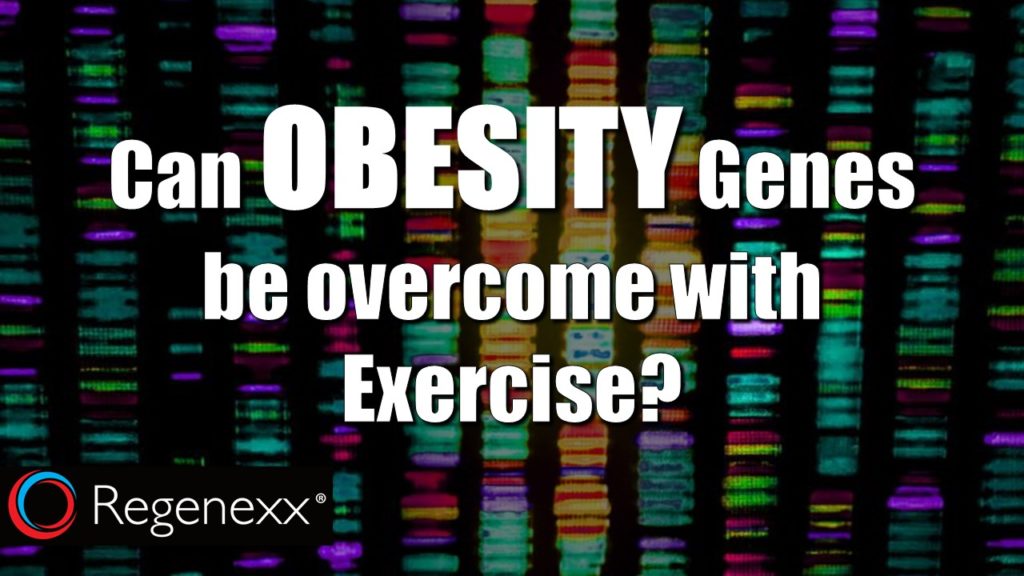Can You Defeat Your Obesity Genes with Exercise?

Genetics vs. Lifestyle: Which Causes Obesity?
You’ve probably heard many people blame their excess weight on their genetics, and the fact is, there is a great deal of truth to it. Many of us really are genetically predisposed to obesity, meaning we carry “obesity genes” passed down from our parents and their parents and so on. Not only do our genes determine all the things we learned about in basic biology, such as eye color, body structure, skin color, and so on, but they also determine our risk for diseases (e.g., arthritis, dementia, certain types of cancer, etc.). However, while we can’t change genetic attributes such as eye color, we can adjust our lifestyle to minimize our risk for diseases or conditions we are genetically prone to, such as obesity.
There’s a whole field of study, which I’ve covered on this blog a few times, dedicated to how environmental influences can alter our genes. This is called epigenetics. Environmental influences can include anything from living in a toxic environment (one study found living close to highways increased the risk of Alzheimer’s dementia for example) to smoking, which is well known to cause cancer, to consuming junk food (e.g., fast food, processed carbs, sugar-laden snacks, etc.) as part of a regular diet, which we know leads to metabolic syndrome and obesity. Add a genetic predisposition for Alzheimer’s, cancer, or obesity on top of these poor lifestyle choices, and it would be almost impossible to dodge the bullet.
Forego the poor lifestyle choices, on the other hand, and replace them with positive choices, and some studies have shown that not only does this, understandably, lower your risk of these conditions, but in some cases, it actually modifies the genetic predisposition as well. Let’s review our feature study on how one lifestyle choice—exercise—seems to modify “obesity genes,” or the genetic predisposition for obesity.
How Exercise Impacts the Genetic Risk for Obesity
The new study consisted of over 8,000 postmenopausal women separated into multiple groups depending on activity level (from high activity to sedentary) and age. The intent was to examine the effect of exercise on those at a genetic risk for obesity, specifically whether or not genetic risk could be modified by exercise. Age was also an indicator analyzed in the study. Researchers found that exercise reduced the genetic risk of obesity in those in the high activity group. Interestingly, the age group this finding was most pronounced in was the age 70 or older participants, the oldest age group. This may suggest that the longer you exercise as you age, the more impact exercise has on your genetic risk for obesity.
More Studies on How Lifestyle Choices, Such as Exercise, Impact our Genes
I’ve covered a lot of studies recently on aging and exercise, and the constant stream of research on the topic continues to support what I say all the time: while you may have an advantage the earlier you start and maintain an active lifestyle, it’s still never too late to start. In fact, today’s study isn’t the first I’ve covered on genetics and aging being impacted by exercise. A study a couple of years ago found that exercise altered six specific genes that were associated with muscle repair and maintenance. Again, interestingly, the effects were most pronounced in older subjects. Here are a few more fascinating studies on genetics worth reviewing:
- If you have a high genetic risk for obesity, a healthy diet may benefit you more than it does someone with a low genetic risk.
- Another study found that women who drink tea experienced positive alterations in genes related to estrogen metabolism and cancer risk.
- Environmental issues, such as chemicals, sun overexposure, and so on can also alter the genetic sequence of our stem cells (our body’s repairmen), creating mutations that can lead to cancer, and this risk increases with age. Alcohol has also been shown to damage stem cell DNA.
The upshot? Think of your genes as the rough outline for a life story. You can either fill in the details along the lines the story dictates or you can rewrite it by making better choices. In this case, exercise can reauthor your genetic story.

NOTE: This blog post provides general information to help the reader better understand regenerative medicine, musculoskeletal health, and related subjects. All content provided in this blog, website, or any linked materials, including text, graphics, images, patient profiles, outcomes, and information, are not intended and should not be considered or used as a substitute for medical advice, diagnosis, or treatment. Please always consult with a professional and certified healthcare provider to discuss if a treatment is right for you.
